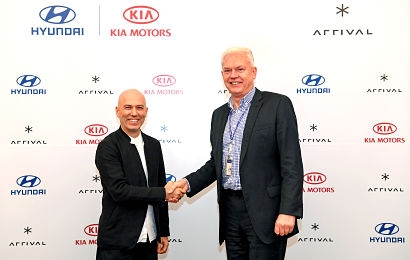
Through the partnership, Hyundai and Kia plan to introduce Arrival’s scalable electric platform, which can be adapted for multiple vehicle categories and types. Arrival, Hyundai and Kia will utilfise these to explore development of a range of Purpose Built Vehicles (PBV), thereby helping to meet rapidly growing demand in Europe for eco-friendly commercial vehicles and accelerate all three brands transition from car makers to clean-mobility providers.
Albert Biermann, President and Head of Research and Development Division for Hyundai Motor Group, and Denis Sverdlovsk, Chief Executive Officer of Arrival, have signed a contract for investment and the joint development of electric vehicles at the headquarters of Hyundai and Kia in Seoul. Of the total investment, Hyundai will contribute 80 million euros; Kia 20 million euros.
“The eco-friendly vehicle market in Europe is expected to grow rapidly due to the introduction of further environmental regulations” said Albert Biermann. “Through the joint development of electric commercial vehicles with Arrival, we will be able to gain a competitive advantage and progressively establish our leadership in the global eco-friendly vehicle market, with Europe at the forefront.”
Arrival’s CEO Sverdlovsk added that the company has created a game changing product category - Generation 2.0 electric vehicles and that Hyundai and Kia have been making amazing vehicles with uncompromising quality, sharing the company’s vision for an electric mobility future. Arrival believes that its Strategic Partnership with Hyundai and Kia will enable it to scale Generation 2 electric vehicles globally and importantly - in the very near future.
Arrival’s ‘skateboard’ vehicle platform has a modular component structure, incorporating a battery pack, electric motor and driveline components. Fully-scalable to accommodate multiple vehicle types, the platform can be used to accelerate vehicle development to meet diverse customer needs. Currently, Arrival is carrying out pilot projects with multiple logistics companies in Europe using cargo vans manufactured with the technology.
With the rapid global growth in online shopping, the volume of light commercial vehicles in urban areas has increased. The demand for eco-friendly commercial vehicles is expected to continue growing as environmental regulations tighten. From 2021, the EU will introduce the world’s most stringent vehicle emissions regulations, limiting each automaker’s fleet-wide average CO2 emissions by around 27 percent, from 130 g/km to 95 g/km. By working with Arrival, Hyundai and Kia plan to supply eco-friendly vans and buses – built in volume and based on Arrival’s platform – to European logistics companies and mobility companies that provide on-demand ride-hailing and shuttle services.
Hyundai and Kia recently announced the development of a fully-electric Purpose Built Vehicle (PBV) and Hyundai presented its PBV concept as one of the smart mobility solutions at CES 2020 earlier this month. At its CEO Investor Day on January 14, Kia also announced its plan to develop a PBV for shared-service companies and logistics companies.
The partnership with Arrival enables Hyundai to accelerate its ‘Two-track’ strategy to deliver battery electric and hydrogen fuel cell solutions for the European commercial vehicle market. To further support that strategy, Hyundai recently established Hyundai Hydrogen Mobility (HHM), the joint venture between Hyundai and Swiss hydrogen energy company H2 Energy. It aims to export 1,600 hydrogen fuel cell trucks to Europe by 2025, following the first export to Europe on January 3 as part of a pilot program.
Under ‘open innovation’ spirit, Hyundai and Kia are exploring partnerships with various businesses to build a leadership position in the rapidly expanding global EV market. In May 2019, Hyundai and Kia invested KRW 100 billion (US $90 million) in Rimac, a Croatian high-performance electric vehicle company, focusing on collaborative research to secure capabilities to lead the global high-performance electric vehicle market. In September 2019, Hyundai and Kia also invested in IONITY, Europe’s largest high-power electric vehicle charging network, and set the stage for sales expansion of EVs within Europe.
For additional information:

